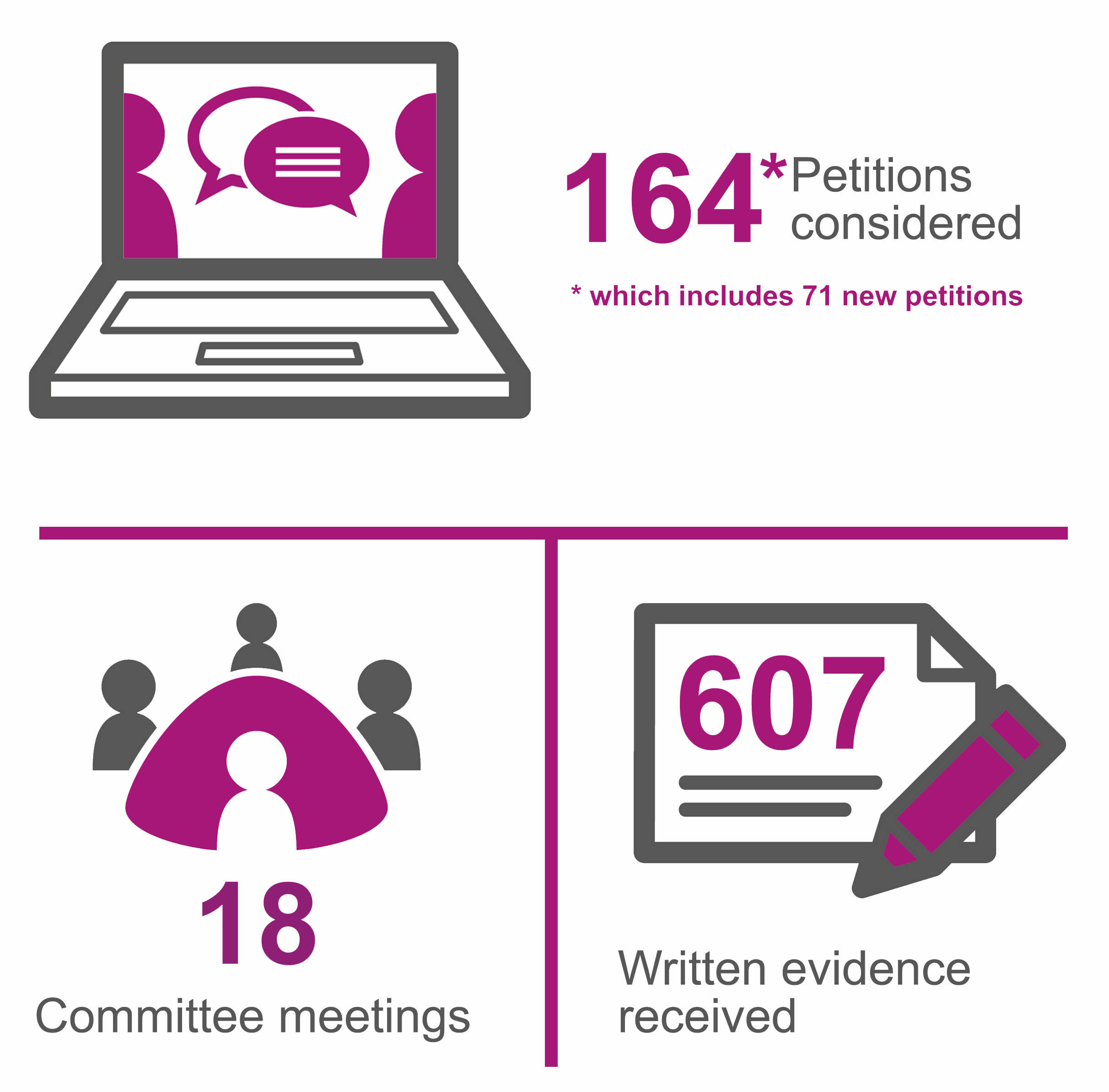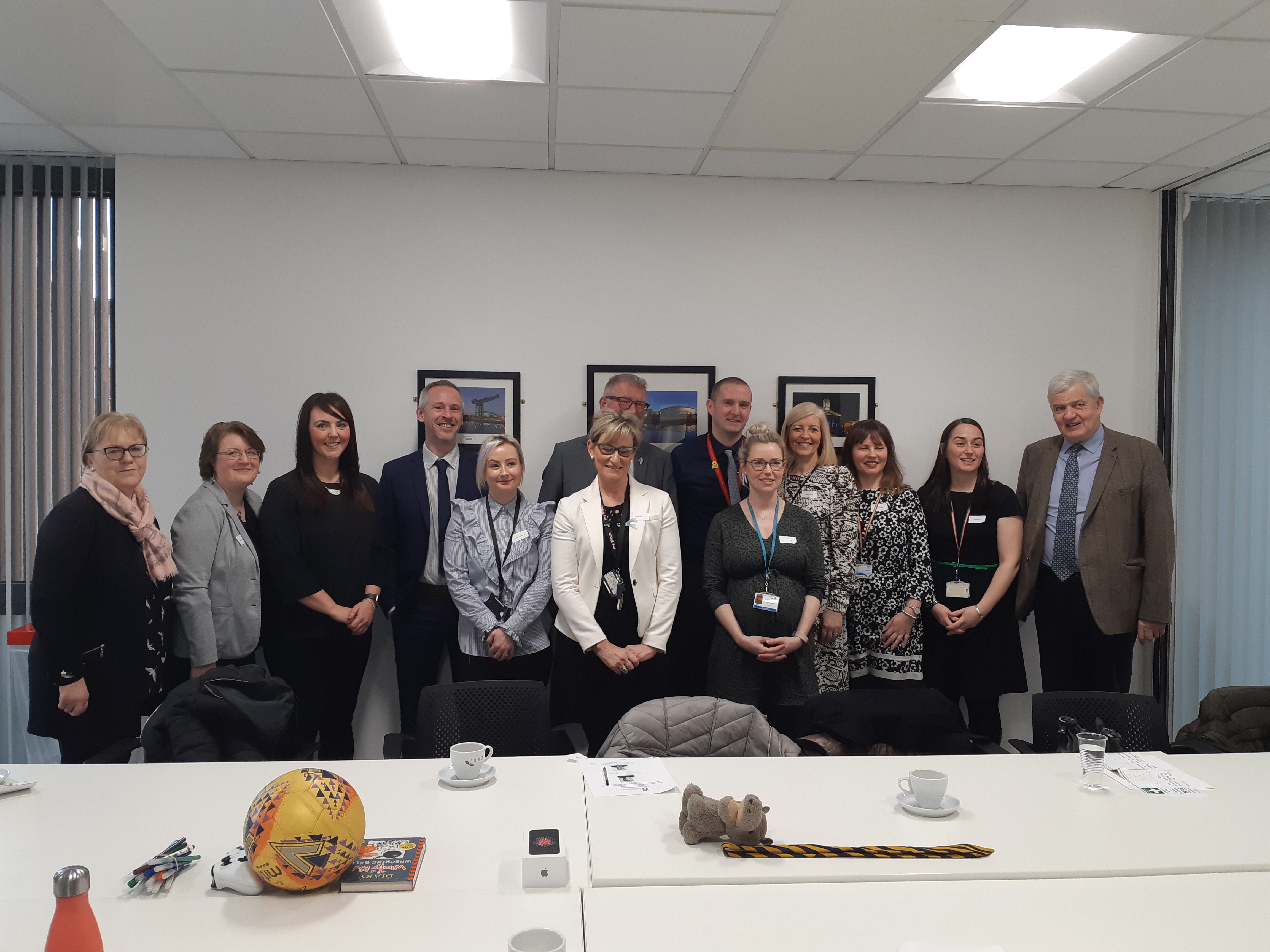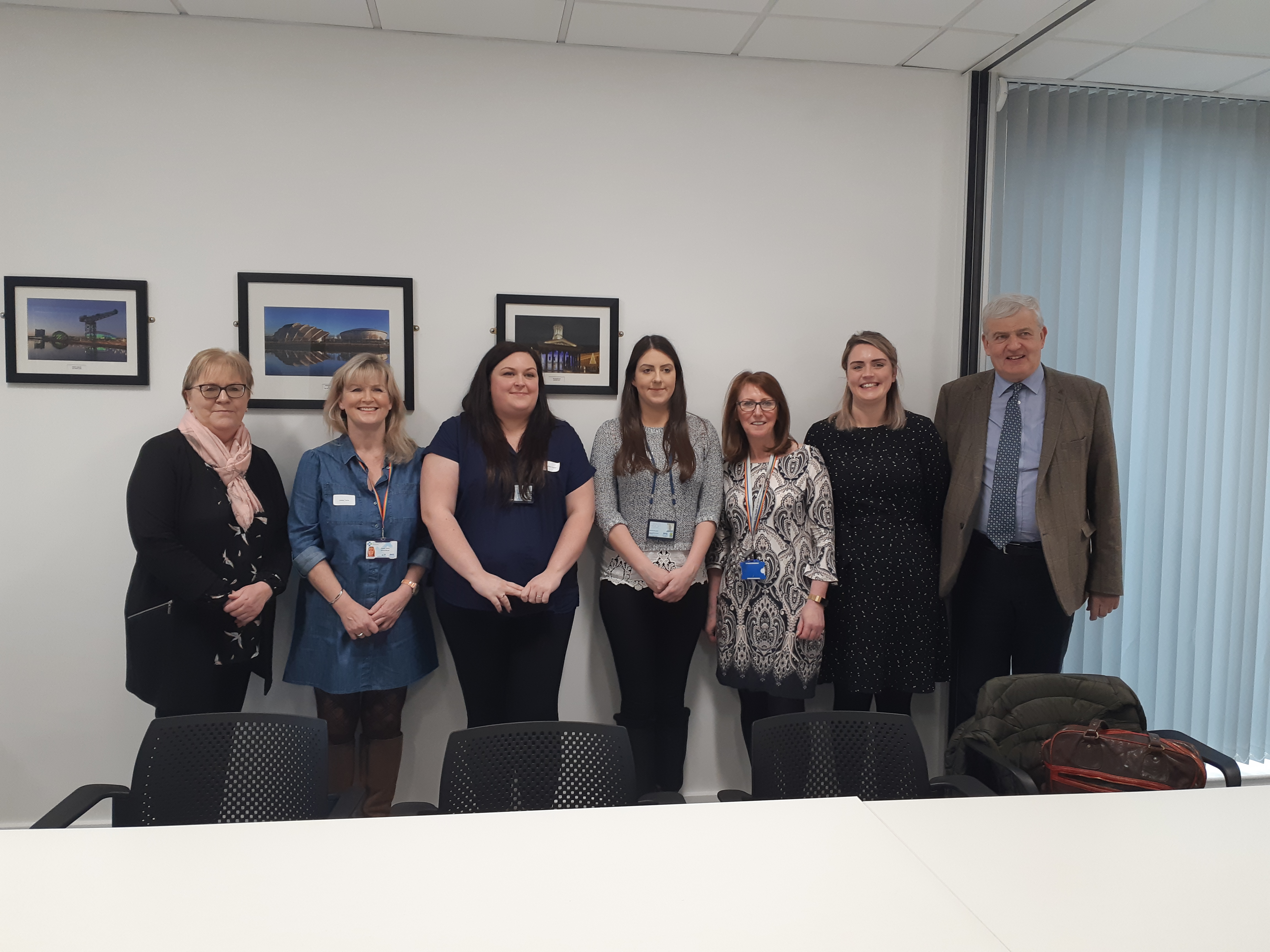Public Petitions Committee
Public Petitions Committee Annual Report 2019-20
Introduction
This report covers the work of the Public Petitions Committee during the Parliamentary year from 12 May 2019 to 11 May 2020.
Previous Members of the Committee during the Parliamentary year–
Angus MacDonald (SNP) (8 June 2016 – 26 August 2019) – replaced by Gail Ross MSP
Rachael Hamilton (Con) (17 May 2018 – 10 September 2019) – replaced by Maurice Corry MSP
Brian Whittle (Con) (8 June 2016 – 25 February 2020) – replaced by Tom Mason MSP
Similar to other Parliamentary committees, the work of the Public Petitions Committee has been significantly affected by the Covid-19 public health emergency. This includes having to cancel three scheduled Committee meetings during the Parliamentary year.
The Committee is currently considering how best to adapt in the current circumstances, in order to progress its work where it is possible to do so.
The work of the Public Petitions Committee
During the Parliamentary year from 12 May 2019 to 11 May 2020, the Committee met on 18 occasions and considered a total of 164 petitions on a diverse range of issues; 71 of these were new petitions published during the Parliamentary year.
A further 16 new petitions were published during the Parliamentary year and await consideration by the Committee when it is able to do so.
The majority of Public Petitions Committee work is considered in public. During the Parliamentary year, no meeting was held entirely in private. On five occasions, the Committee held part of its meeting in private to consider items of business including draft reports, the approach to its inquiry into mental health support for young people in Scotland, the Committee’s work programme and its review of the public petitions system.
The Committee gathers a significant proportion of its evidence through written submissions from—
the Scottish Government
petitioners
members of the public
relevant organisations with an interest in the petition.
In total, the Committee received 607 written submissions during the Parliamentary year.
The Committee also takes oral evidence on petitions. During the Parliamentary year, the Committee took evidence from six petitioners. The Committee also took evidence from Scottish Government ministers as follows—
Minister Petition(s) Cabinet Secretary for Education and Skills PE1548: National Guidance on Restraint and Seclusion in Schools
PE1596: In Care Survivors Service Scotland
PE1711: First Aid Training for All Primary School Children in Scotland
Cabinet Secretary for Environment, Climate Change and Land Reform PE1674: Managing the Cat Population in Scotland
Cabinet Secretary for Health and Sport PE1690: Review treatment of people with ME in Scotland
Cabinet Secretary for Transport, Infrastructure and Connectivity PE1540: Permanent Solution for A83
Minister for Public Health, Sport and Wellbeing PE1463: Effective thyroid and adrenal testing, diagnosis and treatment
During the Parliamentary year, the Committee also held two round table evidence sessions on—
PE1678: National strategic framework for Countryside Ranger Services in Scotland and;
PE1662: Improve Treatment for Patients with Lyme Disease and Associated Tick-borne Diseases.
No reports were published, or debates held in chamber during the Parliamentary year.
Scottish Parliament
On occasion, the Committee decides to meet with petitioners out with the Scottish Parliament. During the Parliamentary year, the Committee carried out three external meetings with petitioners to gather evidence on the following petitions—
PE1596: In Care Survivors Service Scotland
On 4 October 2019 the Convener, Johann Lamont MSP and Brian Whittle MSP, met the petitioner and a representative from Wellbeing Scotland. During the meeting, the petitioner reiterated and expanded on points made in previous written submissions.
PE1770: Improving Water Safety
On 17 February 2020, the Convener met with the petitioners at their home, as they were unable to attend a meeting at the Scottish Parliament scheduled for 16 January 2020.
PE1725: Suicide awareness and support for young people
On 18 February 2020, the Convener and Maurice Corry MSP, met with the petitioner and young people and their families at the offices of Friends Affected by Murder & Suicide, to find out more about their work.
Information gathered during these meetings will be used to help inform what further action the Committee may wish to take on the petitions at a future date.
Non-Committee MSPs regularly attend Public Petitions Committee meetings. Throughout the Parliamentary year, a total of 25 non-Committee MSPs attended Committee meetings in connection with 29 petitions, with some members making contributions on multiple petitions that they had an interest in.
In its consideration of petitions, the Committee can decide to send (“refer”) the petition to another committee to look at it further, particularly if it links to work currently under consideration by that committee. During the Parliamentary year, the Committee referred a petition to another committee on 14 occasions. Examples include—
PE1721: National tourism strategy for Scotland and the role of the National Trust for Scotland.
The Committee agreed to refer the petition to the Culture, Tourism, Europe and External Affairs Committee on 5 December 2019 to inform its scrutiny of the Scottish Government’s tourism strategy.
PE1548: National Guidance on Restraint and Seclusion in Schools.
The Committee agreed to refer the petition to the Education and Skills Committee on 19 December 2019, recognising work currently ongoing by the committee in relation to additional support for learning.
PE1710: Community hospital and council care home services in Scotland.
The Committee agreed to refer the petition to the Health and Sport Committee on 20 February 2020, recognising the opportunity for the concerns raised in the petition to inform its planned social care inquiry.
Inquiry into mental health support for young people in Scotland
During the Parliamentary year, the Committee embarked on a series of external engagement events to support its inquiry, with the aim of understanding how young people feeling low and/or anxious can get the advice and support they need at the right time.
As part of this engagement work, the Committee met with a wide range of people including young people, parents and carers, third sector practitioners, GPs, teachers, pupil support assistants, school nurses, educational psychologists and education officials.
Johann Lamont MSP and Maurice Corry MSP striking a power pose with pupils and staff, from across the Scottish Borders, at Galashiels Academy.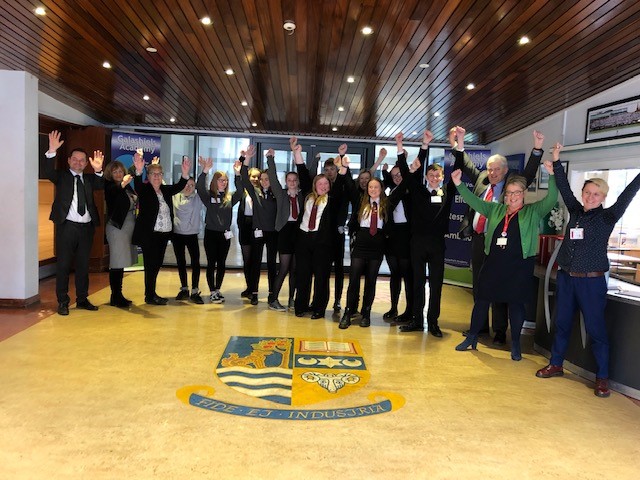 Scottish ParliamentDuring the visit to Galashiels Academy, the pupils talked about being Mental Health Ambassadors within their individual schools.
Scottish ParliamentDuring the visit to Galashiels Academy, the pupils talked about being Mental Health Ambassadors within their individual schools.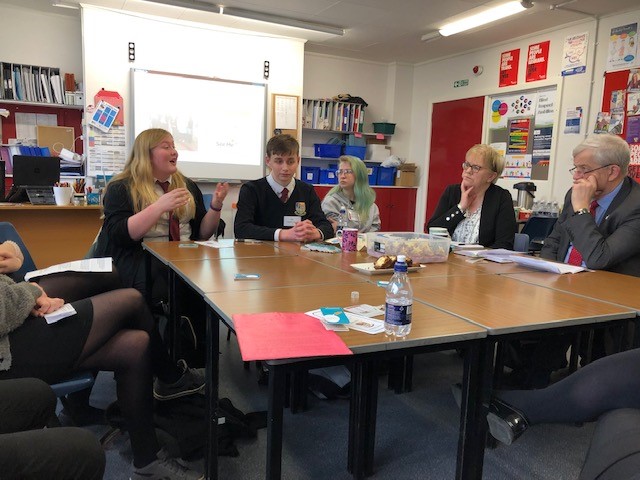 Scottish ParliamentMembers of the Committee met with guidance teachers, pastoral care teachers and wellbeing teachers to hear about their experiences of supporting young people and to learn about their use of an early intervention anxiety management programme.Scottish ParliamentMembers of the Committee also met with school nurses to hear about their experiences of supporting young people and to learn about their use of the early intervention anxiety management programme.Scottish ParliamentMembers of the Committee met with parents and carers to learn about their experiences of supporting their children.Scottish Parliament
Scottish ParliamentMembers of the Committee met with guidance teachers, pastoral care teachers and wellbeing teachers to hear about their experiences of supporting young people and to learn about their use of an early intervention anxiety management programme.Scottish ParliamentMembers of the Committee also met with school nurses to hear about their experiences of supporting young people and to learn about their use of the early intervention anxiety management programme.Scottish ParliamentMembers of the Committee met with parents and carers to learn about their experiences of supporting their children.Scottish Parliament
The Public Petitions Committee also worked in partnership with the Health and Wellbeing Committee of the Scottish Youth Parliament to consider the issue of peer mental health support when the Scottish Youth Parliament sat in Dunfermline in October 2019.
Information gathered during these events will help to inform the final stages of the Committee’s inquiry work.
Equalities
The Committee recognises the importance of ensuring that equal opportunities is mainstreamed into all of its work. This includes striving to ensure there is diversity in the witnesses called to give oral evidence.
In total, the Committee took evidence from 46 witnesses during the Parliamentary yeari. There were 21 female witnesses (46%) and 25 male witnesses (54%).
What petitions have achieved
The Committee values the role that petitions play in raising awareness of issues that may not otherwise reach the attention of the Scottish Parliament.
As well as raising awareness of an issue, petitions can also help deliver positive change to the way things work in Scotland. Some examples of petitions that could be considered to have achieved this during the Parliamentary year include—
PE1463: Effective thyroid and adrenal testing, diagnosis and treatment
On 26 September 2019, the Committee agreed to close the petition as the Scottish Government is taking active steps to address the issues raised by the petition.
PE1595: Moratorium on shared space schemes
On 21 November 2019, the Committee agreed to close the petition as the Scottish Government is currently undertaking work to develop new guidance on shared space schemes and the petitioner is engaged in this work.
PE1711: First Aid Training for All Primary School Children
On 19 December 2019, the Committee agreed to close the petition as the Scottish Government is undertaking work relevant to the action called for in the petition and the petitioner is engaged in this work.
PE1737: Review of hate crime legislation and security funding in Scotland On 5 March 2020, the Committee agreed to close the petition as the Scottish Government have introduced a security fund for places of worship.
Operation of the petitions system
The Public Petitions Committee has a remit to “keep under review the operation of the petitions system”. The Committee has undertaken significant pieces of work throughout the Parliamentary year. This includes updating–
The Determination on the proper form of Petitions (June 2019)
Petitioning the Scottish Parliament guidance (August 2019)
Further work is ongoing to improve the accessibility and efficiency of the public petitions system during 2020/21. This includes the publication of a Vision Statement for the Committee and the development of updated guidance on how to provide written submissions to the Committee.
Feedback from petitioners
The Committee regularly seeks feedback from petitioners as part of its remit to keep the petitions system under review. Examples of positive feedback received during the Parliamentary year include—
The Petitions system allows members of the public to bring to the attention of Parliamentarians serious issues that often get buried by civil servants. The fact that a serious subject does reach a Parliamentary Committee irrespective of the outcome often gives the public the confidence they need to continue with their fights against the system.
It enables a citizen to raise an issue, demonstrate that there is support and have the issue examined by members of the parliament. The facility to watch the proceedings live or recorded, and to get a written transcript is first class.
Petitioners have also suggested areas where the current petitions system could be improved. For example, one petitioner suggested that the Committee should “increase awareness” of its role, while another felt that there needs to be “much greater balance to the PPC scrutiny by taking evidence from all parties”.
The Committee will continue to use the feedback it receives to inform its regular review of the petitions system.
